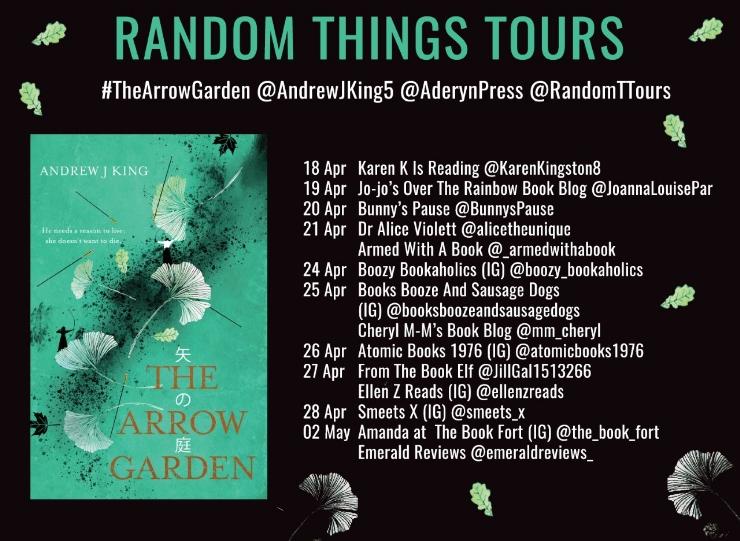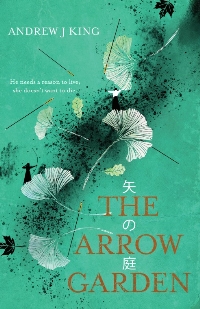Blog tour: The Arrow Garden by Andrew J King

This post is part of a blog tour organised by Random Things Blog Tours. I received a free copy of the book in return for an honest review.
‘He needs a reason to live, she doesn’t want to die.
‘When lonely and socially isolated translator Gareth takes up traditional Japanese archery in 1990s Bristol, he learns that to study Kyudo is to reach out, to another culture, another time, other people…
‘But when one of them reaches back, two lives that should never have touched become strangely entangled.
‘In wartime Tokyo, Tanaka Mie finds herself wandering the burned-out ruins of her dead parents’ fire-bombed home, with only hazy recollections of how she survived.
‘Setting out on a hike to a mountain village shrine, away from the charred city, she begins a life to which she is not sure she is entitled, a life which feels like living on the other side of the sky.
‘To visit the past or the future, even in imagination, is to change it. But it is also to be changed.’

The Arrow Garden, by Andrew J King, alternates between the stories of Gareth, in late-90s Bristol, and Mie, whose story begins in Tokyo in 1945.
While their experiences differ in all sorts of ways, the pair have three things in common: they both have training in Kyūdō (traditional Japanese archery); they both know Hiroshi (Gareth’s colleague, and Mie’s nephew); and they are both quiet, diffident characters who feel undeserving and afraid of taking up space in the world.
The author builds up a full picture of both their lives – Gareth’s over a few months as he finds a rare friend in Hiroshi and a new interest in Kyūdō; Mie’s over a few decades as she goes from cherished daughter of intellectuals, to traumatised young adult war orphan, to beloved maiden aunt – and keeps you wondering: when, and in what circumstances, are the two going to meet?
I’ll get to that, and my thoughts on it, behind a spoiler warning later in this review. Suffice it to say here, it sent a bit of a shiver down my spine.
I found it really interesting to read about the traditions and practices of Kyūdō. Mie’s experiences living in Japan over much of the twentieth century were also fascinating to me.
Mie is averse to any sort of attention, and thinks of herself as someone who drifts through life. However, she actually shows considerable strength and self-knowledge in managing to carry on as she does after the devastating loss of her home and parents, turning down an ardent suitor, and opting out of dating altogether. Eventually, the perfect intellectual occupation for her materialises, more or less by chance.
Gareth doesn’t cut himself much slack, either. He’s clearly coded as autistic, but as it’s the 90s, he thinks he’s just plain weird, and so does everyone around him. He’s a lonely outsider when Hiroshi takes him under his wing and teaches him Kyūdō. It’s really gratifying to watch Gareth develop a passion that opens up possibilities and makes him feel like life is worthwhile after all.
As I share quite a few of their traits, I found both Gareth and Mie relateable and sympathetic. They’re quiet, understated heroes in this story, Mie because of her aforementioned resourcefulness, endurance, and strength, and Gareth because of something he does - but that’s for the next section. Don’t click the line below if you don’t want to know what happens!
Here be spoilers
The timeslip in this story is such that the two main characters occupy the same space for 12 hours at most – but that's enough time for Gareth to get Mie out of harm's way, so she survives the war and goes on to live a long life.
The limited nature of the timeslip gives King ample space to explore how someone might react to such an event depending on their personality, circumstances, and knowledge of what's going on.
A more extensive and involved timeslip would also have diluted two key messages conveyed by The Arrow Garden: that just one small change in the timeline can have far-reaching consequences; and any life is worth saving, however "small" or "insignificant" the survivor believes themselves to be.
Mie's reaction to surviving the bombing that killed her family in such an extraordinary way is complex.
For one thing, unlike Gareth, she doesn't know what's happening. One minute she's in familiar surroundings; the next, she's in a place and time completely alien to her; then, a few hours later, she's back home, but it's been destroyed and her parents are dead. It's no wonder she's confused by her memories, or that she waits so long to share them with anyone.
Mie experiences considerable survivor's guilt, which is also understandable. Surviving the bombing that killed her parents would probably have had that effect without the intervention, but her outlandish method of escape intensifies her feelings that she wasn't meant to have survived.
It's for this reason that Mie treads so lightly for the rest of her life. While she may not go on to cure cancer or bring about world peace, she has remaining family and friends who love and value her, and I'm glad her story didn't end in 1945.
In addition, there's a mind-bending predestination paradox at the heart of The Arrow Garden concerning Hiroshi's appearance and intervention in Gareth's life. I'm still turning it over in my head now!
The Arrow Garden is fascinating, surprising, and a little spooky.
